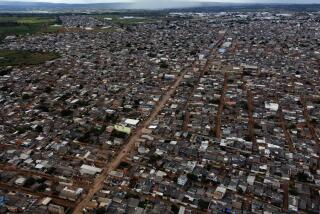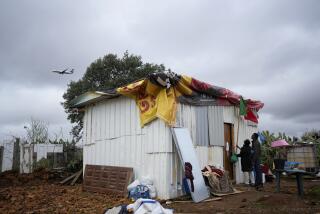Seedy Kind of Tourism Boom
- Share via
FORTALEZA, Brazil — On the outside, the Villa Veneto is just another of the nondescript high-rise hotels catering to the foreign visitors who flock to this beachside resort town.
But take a look inside, and something unusual becomes apparent. A large number of the hotel’s clientele, it seems, fit a particular profile: single, middle- aged European men, some overweight, others balding, and many in the company of scantily dressed, attractive young Brazilian women less than half their age.
These aren’t businessmen in town for a convention. Chances are, authorities say, they’re sex tourists, men seeking flesh for sale thousands of miles from home, in a land where they are anonymous and, by local standards, fabulously rich.
Over the last several years, Fortaleza and other cities along Brazil’s northern coast have increasingly become magnets for what officials lament are the wrong kinds of visitors. Travel agencies in countries such as Italy and Germany openly market tour packages to Brazil that include the services of female escorts, sometimes girls barely into their teens.
Now officials here are trying to stop the burgeoning trade, even as events around the world threaten to thwart them.
“UNICEF and international groups have really had their eyes trained on Asia,” where sex tourism has long been a problem, said Patricia Campos of Cedeca, a local human rights group. Because of that, “there’s been a migration of tourists of this kind to the northeast of Brazil -- to Fortaleza, Natal, Recife. With the recent [tsunami] catastrophe in Asia, we’re afraid that this shift will intensify.”
Fighting it, however, means taking on the law of supply and demand in one of the poorest parts of the country, where thousands live in miserable slums and prostitution is often seen as a quick way out. Paid sex is allowed in Brazil; only pimping is illegal. Another twist in the law makes it difficult even to arrest men who pay for sex with girls between the ages of 14 and 18, although legislators are hoping to close that loophole.
To reverse the influx of sex tourists, authorities are faced with the daunting task of dismantling an industry that involves not just the hookers and their customers, but cabbies, hoteliers and even real estate agents, all of whom have cornered their own bit of profit from the traffic in sex.
Ask almost any taxi driver, for example, and he’ll know how to fix you up with a girl -- or boy -- to your liking, for an extra tip. Hotel clerks, their bosses bent on boosting occupancy, look the other way when guests bring back paid companions, even those who appear to be minors. Real estate agents unload properties on free-spending foreigners planning on holding sexual encounters there for themselves and others.
“There’s a network of sexual exploitation that we didn’t know about, that has been invisible,” said Luizianne Lins, Fortaleza’s newly elected mayor. “The right to sexual pleasure is a human right. But when you cross the Atlantic in order ... just to do this, there’s something wrong.”
As a city councilwoman, Lins was the chief author of a report in 2002 that delved into the phenomenon of sex tourism and criticized authorities for doing little to combat it.
Last month, Italian police arrested a travel agent who allegedly arranged trips to Brazil for customers interested in having sex with underage girls. And in October, officers here arrested a German resident of Fortaleza who allegedly used the Internet to help set up visiting Europeans with prostitutes, as well as send local girls to Germany to work as hookers there.
But such arrests have been few and far between in this city of 2 million people, in a region almost legendary for its poverty. In history and in literature, Brazil’s nordestinos, the men and women of the northeast, are the country’s down-and-outs, battered by droughts, forced to fan out across the country in search of work and sometimes so destitute they starve to death.
Turning tricks earns 20-year-old Joanaina Dias Matos a few hundred dollars a month, much more than the national monthly minimum wage of about $95. If she plays her cards right -- some flattery here, an extra bit of flirting there -- Matos can score gifts and drinks and a little extra to put away for her two children.
She divides her time between Iracema Beach and the Beira Mar district, two popular hangouts, where evidence of prostitution is obvious, and so is a bad aftertaste of colonialism. Tables along the seaside promenade are filled night after night with raucous groups of male European tourists quaffing beer, chatting in German, Italian and French, and slinging pale arms around thin, dark-skinned local girls.
Petite and self-assured, dressed in a tube top and a tiny blue wraparound skirt, Matos looks barely 15, a youthfulness that has served to her advantage.
“The men always say, ‘I want them young.’ They don’t believe I’m 20,” she said with a tiny smirk. Her normal fee for sex is about $18, or more now that it’s the Brazilian summer; in low season, the price can drop to about $10.
Fortaleza’s rise as a travel destination has been relatively recent compared with cities such as Rio de Janeiro or Salvador. It began to take off during the 1980s, marketed as an attractive option because of its proximity to Europe, affordability and pristine beaches.
It didn’t take long for tour operators to discover that spicing their packages with the promise of sex could be lucrative.
“These companies were making a good profit. But these companies have seen that it’s very easy here to have sex -- not only easy and cheap, but also very safe, because Brazil is a developing country with the best AIDS-control program in the world,” said Thomas Wlassak of the country’s federal police.
Soon, men started filling the seats of regular and charter flights bound for northeastern Brazil from Europe. In 2000, for instance, 78% of the tourists who came to Fortaleza were men, the overwhelming majority between the ages of 26 and 50, according to the report on sex tourism issued three years ago.
Whether a newly announced crackdown on the trade will have much effect remains to be seen. A report released last month by the federal government said that one-fifth of Brazilian cities had underage prostitution rings. Authorities, who want to cut the number in half, have launched a national campaign.
Posters at the airport warn that sexual exploitation is a crime. Officials are trying to persuade hotel and taxi operators to adhere to a code of conduct against aiding and abetting prostitution.
They hope that the recent arrests in Italy and here in Fortaleza will deter those tempted to pander, but Wlassak said procurers were already finding new ways to thwart police.
“They’re changing their modus operandi. Now they’re buying houses near to the beaches and the city and taking the tourists there, because we don’t have so much access to these houses,” he said. “We have to ask the judge to issue a warrant to get inside these houses. It’s very much harder. It’s very difficult to investigate these people.”
Activists complain that the government’s nice-sounding words aren’t backed up by the necessary funds. An earlier statewide plan to centralize social services for street children and boost the number of police officers who work with minors received only $500,000 last year, far short of the $2.6 million needed, said Marcia Cristine Oliveira of the children’s advocacy group Curumins.
“It doesn’t help to have a thousand different ideas and not have the money to do any of it,” Oliveira said.
Matos, the 20-year-old, wants a better life for her 5-year-old daughter. Her voice momentarily wistful as she got ready to hit the beach again, she said, “Hopefully Brazil will be better then than it is now.”
More to Read
Sign up for Essential California
The most important California stories and recommendations in your inbox every morning.
You may occasionally receive promotional content from the Los Angeles Times.











